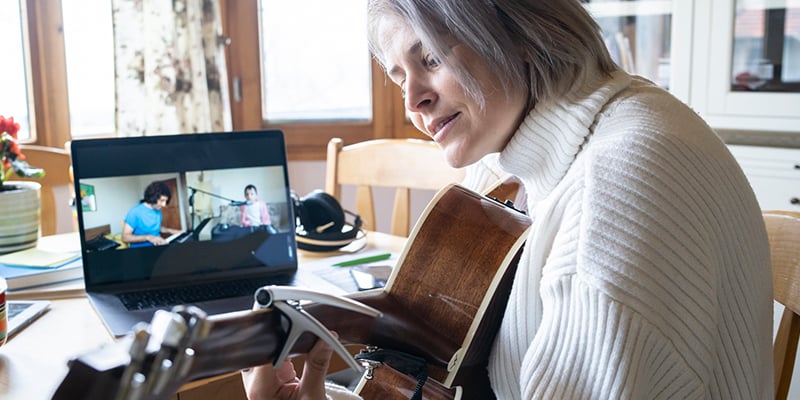
A new study shows 4 in 10 Americans are lonelier than ever due to the coronavirus pandemic and shelter-at-home orders. Being separated from family, friends, and everyday friendly acquaintances is taking a toll on our well-being. It’s no wonder why—humans are social animals. Social connectivity is hard-wired into our brains, and when we feel lonely, it can have negative consequences for us emotionally, cognitively, and physically.
In 2017, the journal Public Health published a review of 40 studies that found consistent evidence showing that social isolation and loneliness worsen mental health. In fact, loneliness has been associated with depression, social anxiety, addictions, and hoarding.
Feeling lonely can have devastating effects on cognitive health. Research presented at the 2015 Alzheimer’s Association International Conference shows that the loneliest among us experience cognitive decline 20% faster than people who are connected to others. And a study in JAMA Psychiatry found that the risk of developing Alzheimer’s disease was more than twice as high in people who are lonely.
In terms of physical health, being lonely is the equivalent of smoking 15 cigarettes a day. And the same Public Health review mentioned above also found that social isolation and loneliness are associated with worse cardiovascular outcomes.
This is tough news considering much of the nation will continue to be on lockdown for the foreseeable future.
What can you do about it?
10 Tips to Feel Less Lonely
1. Reach out to friends and family.
Call the people you care about or schedule video conferences or FaceTime chats to be able to see each other as you speak. If it helps you, make a schedule for regular calls. This way, when you’re feeling like you’re all alone, you can remember that you’ll be talking to someone you care about soon.
2. Attend church online.
Feeling connected to your faith can be very important in helping you avoid loneliness. Many churches are conducting services online and hosting small group discussions using video conferencing. Be sure to tune in.
3. Get social on social media.
Take advantage of Facebook, Instagram, and other social media apps to share posts and quarantine photos with your friends. You may also want to join a Facebook group where you can connect with people who have similar interests or hobbies—whether it’s your favorite dog breed, knitting, tennis, or guitar players. On your Facebook feed, simply go to Groups, click on Discover, and start exploring.
4. Play games.
If you enjoy playing games, sign up to play Words With Friends and invite your relatives to play or play against others at your skill level. Sports lovers who are missing the action right now might want to check out virtual sports games where you can connect with fellow fans. There’s also an app called Houseparty that lets you play games online with friends in real-time.
5. Sign up for an online class.
Taking a digital course where you learn from an online instructor can be a good way to feel connected and do something beneficial for your cognitive function. Try the Change Your Brain Master’s Course taught by Daniel Amen, M.D. to learn how to boost your brain health and mental well-being.
6. Practice random acts of kindness.
Feeling like you are supporting others in some way can be very helpful in alleviating loneliness. Some ways to do it while still practicing safe physical distancing include checking in on any elderly or vulnerable neighbors with a call or text or donating blood to the American Red Cross, which is still encouraging donations during the pandemic.
7. Get outside and get creative.
Just taking a walk in your neighborhood can give you the opportunity to see and say hello to neighbors from a safe physical distance. Or take a cue from people around the world and start singing from your balcony (like Spanish singer Beatriz “Betta” Berodia) or clap and make noise from your windows (like they’ve been doing in New York City and San Diego, CA). You may start a trend, and it can help you feel connected.
8. Consider fostering a pet.
Pets can provide comfort, companionship, and love. If you’re stuck at home and have more time on your hands than usual, think about fostering a furry four-legged friend. Petting a dog has been shown to trigger the release of the feel-good neurotransmitters oxytocin and dopamine, and studies show that having a pet can be beneficial for moods, anxiety, and stress.
9. If you’re single, keep dating online.
It may seem like the worst time to try to meet someone new when you can’t go on a real date but think of this as an opportunity to get to know someone better before meeting in person. A video chat, while you’re both in your quarantine sweats at home, might actually be a less stressful way to connect with a special someone.
10. Reach out for professional help.
If your feelings of loneliness are overwhelming and you need support, seek treatment through mental telehealth opportunities. You don’t need to suffer or wait until the pandemic is over to get the help you need.
If you’re struggling with anxiety, panic attacks, depression, or other mental health issues, you aren’t alone—45% of Americans say the coronavirus pandemic has impacted their mental health. Just because you’re sheltering at home doesn’t mean you have to wait for the pandemic to be over before seeking help. In fact, during these uncertain times, your mental well-being is more important than ever, and waiting to get treatment is likely to make your symptoms worsen over time.
At Amen Clinics, we’re here for you. We offer mental telehealth, remote clinical evaluations, and video therapy for adults, children, and couples, as well as in-clinic brain scanning to help our patients. Find out more by speaking to a specialist today at 888-288-9834. If all our specialists are busy helping others, you can also schedule a time to talk.





No Comments »
No comments yet.
RSS feed for comments on this post.
Leave a comment